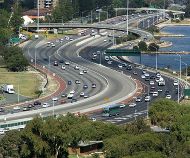12/12/2011
Sluggish Economy Yields Record Traffic Safety BenefitFatal accidents drop to a 61-year low, including in states where red light cameras are banned.

Fewer people died on America's roads than at any time in the past sixty-one years, according to an analysis of 2010 accident data by the National Highway Traffic Safety Administration (NHTSA). Some in the transportation industry have cited their own public policies or products as the primary reason for the statistical improvement announced Thursday, but the evidence suggests other factors such as advances in technology and the lingering effects of the past recession are at play.
"It's the result of three important factors," Transportation Secretary Ray LaHood wrote in his FastLane blog. "Cars are safer as crash avoidance and crash worthiness technologies continue to improve. Roads are safer with safer intersections, better signs and lighting, improved pavement technologies, and more effective crash barriers. Drivers are safer, buckling their seatbelts at record rates and choosing not to get behind the wheel after drinking."
Crash fatalities dropped 2.9 percent last year to 32,885, a figure only bested by 1949's death toll of 30,246. Sixty-one years ago, there were fewer cars and fewer roads, so the number of vehicle miles traveled that year were one-seventh of what they are today. Last year's fatality rate dropped 4.3 percent to an all-time low of 1.1 deaths per 100 million miles traveled.
According to NHTSA, accidents caused last year by drivers with a blood alcohol level in excess of the .08 legal limit accounted for about a third of the crash fatalities, 10,228. That represents a drop of 4.9 percent. The majority of these incidents were single-vehicle collisions where the driver killed himself.
Traffic camera vendor American Traffic Solutions (ATS) issued a press release through its front group, the National Coalition for Safer Roads (NCSR) attempting to claim credit for the good news as if it were due to the benefits of their automated ticketing product.
"This is a tribute to all the dedicated safety advocates and organizations working to implement traffic safety programs and policies on the ground," NCSR spokesman David Kelly wrote in a press release. "We've made great strides in reducing fatalities and injuries, but we must continue to do everything possible to make roads and intersections safe -- including expanding the use of intersection safety cameras -- to drive down the unnecessary deaths and injuries from crashes on our roadways."
The evidence shows no correlation between the presence of automated ticketing and reduced collisions. In Alaska, a referendum and appellate court decision struck down the use of photo radar, but fatalities dropped 13 percent there last year. Minnesota's high court eliminated red light cameras and forced Redflex Traffic Systems to refund every illegally issued citation. Accidents dropped 2.4 percent in the state. Nebraska courts rejected cameras and deadly accidents were down 15 percent.
Many other states with legislative prohibitions on photo enforcement saw safety improve. Fatal collisions in Arkansas declined 5.5 percent; Mississippi dropped 8.4 percent; Montana dropped 14 percent; South Carolina saw a 9.4 percent reduction; Utah fell 3.3 percent; and West Virginia accidents declined 12 percent.


